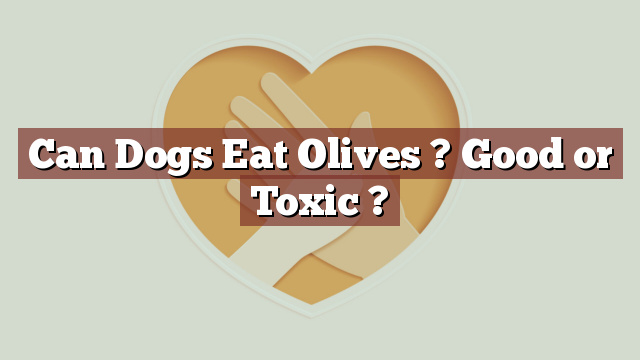Can Dogs Eat Olives? Good or Toxic?
Knowing what foods are safe for our pets to eat is essential for their overall health and well-being. One common question that arises is whether or not dogs can eat olives. In this article, we will delve into the nutritional value of olives, explore whether they are safe or toxic for dogs, discuss the potential risks and benefits of feeding olives to dogs, and provide guidance on what to do if your dog eats olives.
Nutritional Value of Olives: Vitamins, Minerals, and More
Olives are a popular snack and ingredient in various cuisines around the world. They are rich in antioxidants, vitamins, and minerals. Olives contain vitamin E, which is known for its ability to support a healthy immune system. Additionally, they are a good source of iron, copper, and calcium, all of which are important for maintaining strong bones and optimal bodily functions. Furthermore, olives provide healthy monounsaturated fats, which can contribute to a balanced diet.
Can Dogs Eat Olives? Discover if They are Safe or Toxic
While olives offer several nutritional benefits for humans, it is important to consider whether they are safe for our furry friends. Dogs can eat olives, but there are some precautions to keep in mind. It is crucial to remove the pits from olives before feeding them to your dog, as they pose a choking hazard and can potentially cause intestinal blockage. Plain, unsalted olives are the safest option for dogs, as excessive salt intake can lead to sodium poisoning in canines.
Potential Risks and Benefits of Feeding Olives to Dogs
Feeding olives to dogs in moderation can have potential benefits. The vitamin E found in olives can contribute to a healthy coat and skin for your furry companion. However, it is important to note that olives should not replace a balanced and complete diet formulated specifically for dogs. Furthermore, some dogs may have digestive sensitivities or allergies to certain foods, including olives. Therefore, it is always recommended to introduce new foods gradually and monitor your dog for any adverse reactions.
On the other hand, the potential risks of feeding olives to dogs include the aforementioned choking hazard from pits and the risk of salt poisoning. Additionally, olives are high in fat content, which can lead to gastrointestinal upset or pancreatitis in some dogs, especially if consumed in large quantities.
What to Do if Your Dog Eats Olives: Symptoms and Actions
If your dog accidentally consumes olives, it is important to observe their behavior and monitor for any potential symptoms. Symptoms of salt poisoning may include vomiting, diarrhea, excessive thirst, decreased appetite, or even seizures. In such cases, it is crucial to contact your veterinarian immediately. If your dog ingests olive pits or experiences any signs of choking, seek veterinary assistance promptly to ensure their airway is clear.
Conclusion: Olives in Moderation Can Be a Safe Addition to Your Dog’s Diet
In conclusion, dogs can safely eat olives as an occasional treat, given that the pits are removed and they are served plain and unsalted. Olives can provide some nutritional benefits, such as vitamin E and healthy fats, but should never replace a balanced and complete diet specifically formulated for dogs. It is important to be aware of the potential risks, including choking hazards and the risk of salt poisoning. Always introduce new foods gradually and monitor your dog for any adverse reactions. If you have any concerns or if your dog exhibits any symptoms after consuming olives, consult your veterinarian for further guidance. With proper caution and moderation, olives can be a safe addition to your dog’s diet.
Thank you for investing your time in exploring [page_title] on Can-Eat.org. Our goal is to provide readers like you with thorough and reliable information about various dietary topics. Each article, including [page_title], stems from diligent research and a passion for understanding the nuances of our food choices. We believe that knowledge is a vital step towards making informed and healthy decisions. However, while "[page_title]" sheds light on its specific topic, it's crucial to remember that everyone's body reacts differently to foods and dietary changes. What might be beneficial for one person could have different effects on another. Before you consider integrating suggestions or insights from "[page_title]" into your diet, it's always wise to consult with a nutritionist or healthcare professional. Their specialized knowledge ensures that you're making choices best suited to your individual health needs. As you navigate [page_title], be mindful of potential allergies, intolerances, or unique dietary requirements you may have. No singular article can capture the vast diversity of human health, and individualized guidance is invaluable. The content provided in [page_title] serves as a general guide. It is not, by any means, a substitute for personalized medical or nutritional advice. Your health should always be the top priority, and professional guidance is the best path forward. In your journey towards a balanced and nutritious lifestyle, we hope that [page_title] serves as a helpful stepping stone. Remember, informed decisions lead to healthier outcomes. Thank you for trusting Can-Eat.org. Continue exploring, learning, and prioritizing your health. Cheers to a well-informed and healthier future!

